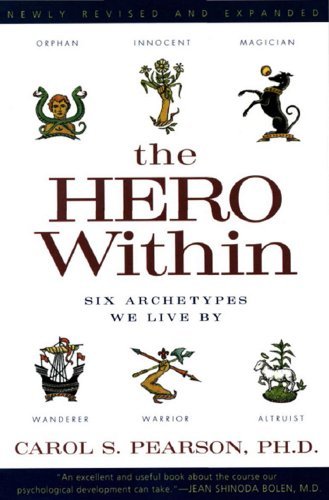What do you think?
Rate this book


The Classic Guide, Updated for Our Contemporary World
A modern classic of Jungian psychology, The Hero Within has helped hundreds of thousands of people enrich their lives by revealing how to tap the power of the archetypes that exist within. Drawing from literature, anthropology, and psychology, author Carol S. Pearson clearly defines six heroic archetypes—the Innocent, the Orphan, the Wanderer, the Warrior, the Altruist, and the Magician—and shows how we can use these powerful guides to discover our own hidden gifts, solve difficult problems, and transform our lives with rich sources of inner strength.
This book will speak deeply to the evolving hero in all of us and reverberate through every part of our lives. With poignant wisdom and prolific examples, it gives us enduring tools to help us develop our own innate heroic gifts—the Orphan's resilience, the Wanderer's independence, the Warrior's courage, the Altruist's compassion, the Innocent's faith, and the Magician's abiding power.
370 pages, Kindle Edition
First published January 1, 1986
"Women, minority men, and the working class all have been culturally define as inferior and, as such, their role is to serve. To the degree that these groups have internalized such ideas, much of their giving and serving is linked unconsciously [...]" - p. 75Implicit biases has been debunked as a concept - I'm talking mainstream science here. But that aside, why is this textbook feminist dribble being injected into a book about archetypes at all?
"The contemporary woman leaves her parents, husband, or lover and takes off too. So prevalent is this expression of the Wanderer archetype that Erica Jong wrote in the 1960s, in How to Save Your Own Life, that 'Leaving one's husband is the only, the cosmic theme'" - p. 75
"What my friend did not see was that her client could not have a happy marriage because as yet she was incapable of taking her own journey while staying with him [...] no matter how wonderful her husband was, he was a captor to her." - p. 83In discussing the "securest people she knows" she writes
"In this list I would put several friends: a woman who knew in her soul she must be an artist and left a marriage to a wealthy man to pursue her art [...]"- p. 89When she uses men as an example, it's often negative:
"Men in this state infantilize women, so that women will not have the confidence to abandon them [...] they want to keep their wives, if not barefoot and pregnant, at least without the skills and confidence needed to have career" - p. 72I'm going to stop here because there's really no value in continuing. Those who are opposed to progressive ideologues have been given warning enough, and those who disagree with me have likely already psychologized my motive for writing this as some sort internalized oppression or other such nonsense.
Heroes have the esteem that comes from personal responsibility, but they have little or no sense of entitlement. To claim the hero within, we must let go of our belief that we are victimised if we do not have perfect parents or a perfect job, a perfect government or unending affluence. The very nature of heroism requires us to face the dragon, not sit around and complain that dragons exist and someone should do something about them. It never was, and it undoubtedly never will be, popular or easy to challenge "Holdfast the keeper of the past."